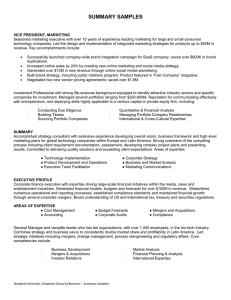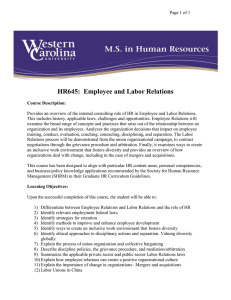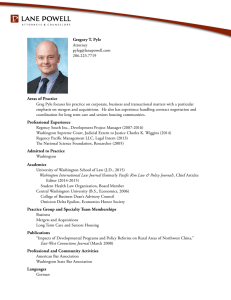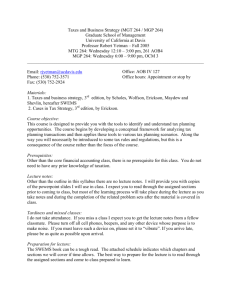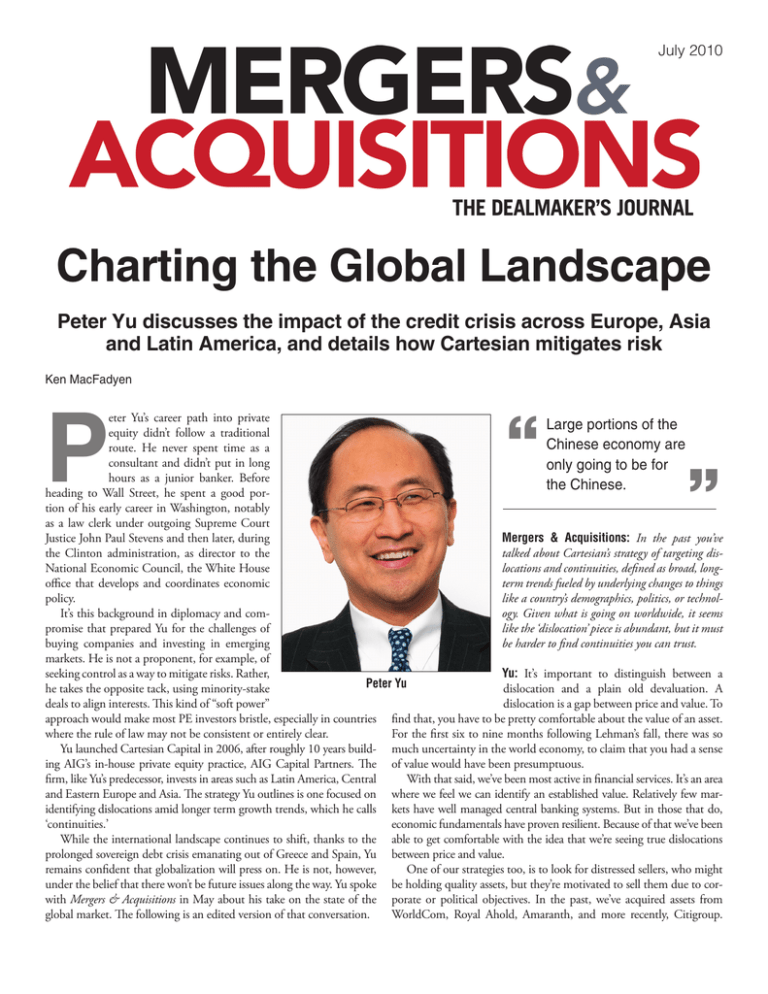
July 2010
Charting the Global Landscape
Peter Yu discusses the impact of the credit crisis across Europe, Asia
and Latin America, and details how Cartesian mitigates risk
Ken MacFadyen
P
“
eter Yu’s career path into private
Large portions of the
equity didn’t follow a traditional
Chinese economy are
route. He never spent time as a
consultant and didn’t put in long
only going to be for
hours as a junior banker. Before
the Chinese.
heading to Wall Street, he spent a good portion of his early career in Washington, notably
as a law clerk under outgoing Supreme Court
Justice John Paul Stevens and then later, during
Mergers & Acquisitions: In the past you’ve
the Clinton administration, as director to the
talked about Cartesian’s strategy of targeting disNational Economic Council, the White House
locations and continuities, defined as broad, longoffice that develops and coordinates economic
term trends fueled by underlying changes to things
policy.
like a country’s demographics, politics, or technolIt’s this background in diplomacy and comogy. Given what is going on worldwide, it seems
promise that prepared Yu for the challenges of
like the ‘dislocation’ piece is abundant, but it must
buying companies and investing in emerging
be harder to find continuities you can trust.
markets. He is not a proponent, for example, of
seeking control as a way to mitigate risks. Rather,
Yu: It’s important to distinguish between a
Peter Yu
he takes the opposite tack, using minority-stake
dislocation and a plain old devaluation. A
deals to align interests. This kind of “soft power”
dislocation is a gap between price and value. To
approach would make most PE investors bristle, especially in countries find that, you have to be pretty comfortable about the value of an asset.
where the rule of law may not be consistent or entirely clear.
For the first six to nine months following Lehman’s fall, there was so
Yu launched Cartesian Capital in 2006, after roughly 10 years build- much uncertainty in the world economy, to claim that you had a sense
ing AIG’s in-house private equity practice, AIG Capital Partners. The of value would have been presumptuous.
firm, like Yu’s predecessor, invests in areas such as Latin America, Central
With that said, we’ve been most active in financial services. It’s an area
and Eastern Europe and Asia. The strategy Yu outlines is one focused on where we feel we can identify an established value. Relatively few maridentifying dislocations amid longer term growth trends, which he calls kets have well managed central banking systems. But in those that do,
‘continuities.’
economic fundamentals have proven resilient. Because of that we’ve been
While the international landscape continues to shift, thanks to the able to get comfortable with the idea that we’re seeing true dislocations
prolonged sovereign debt crisis emanating out of Greece and Spain, Yu between price and value.
remains confident that globalization will press on. He is not, however,
One of our strategies too, is to look for distressed sellers, who might
under the belief that there won’t be future issues along the way. Yu spoke be holding quality assets, but they’re motivated to sell them due to corwith Mergers & Acquisitions in May about his take on the state of the porate or political objectives. In the past, we’ve acquired assets from
global market. The following is an edited version of that conversation.
WorldCom, Royal Ahold, Amaranth, and more recently, Citigroup.
”
In these cases, when price becomes a secondary consideration, the dislocation is not necessarily a macro-driven event.
Mergers & Acquisitions: Have you looked at any of AIG’s assets?
Yu: We looked at some of the assets, but most of what AIG is selling is
of the scale that makes more sense for strategic buyers. Also, we won’t
participate in competitive situations. We never take proposals from investment bankers. Private equity is about finding market inefficiencies,
so every deal we’ve pursued comes from something we’ve created.
Mergers & Acquisitions: What might be a recent example of the things
you’re pursuing?
Yu: A year ago, we spent a lot of time looking at companies that we
thought would be the survivors in the next generation of financial services. We were looking at things like credit cards in China, mortgage
lenders in the Ukraine, and ultimately found a mid-market commercial
bank in Brazil. At the time, in October, 2008, the financial services
sector was going through a very dark period, but we were attracted to
Brazil because it has a well managed central bank.
Banco Daycoval is controlled by the family of Moshe Dayan. During the financial crisis, the bank needed to raise long-term private capital at a time when the only people investing in banks were the governments. The assets, historically, showed a return on equity of 15% and
had a cap ratio of 20 percent. Our investment took the form of a fiveyear certificate of deposit, which carries a 15% interest rate. We also
secured warrants for common and preferred shares exercisable at a price
equivalent to the company’s 2008 book value. The deal has the equity
upside of a traditional investment, but the downside of a CD. It goes
back to our strategy of trying find long-term value, while structuring
our investments to manage the risks.
Mergers & Acquisitions: Being an emerging market investor that primarily makes growth capital plays seems like a strategy that comes with a
lot of risk in a normal market. How do you manage that in an environment like today?
Yu: We almost exclusively target minority-stake investments. Like the
Daycoval deal, what we’ll do is try to buy new shares in companies as
opposed to old shares, and our goal is to help bring a business to a level
that creates higher multiples for everyone involved. We’re specifically
looking for businesses that are market leaders in their home jurisdictions and we’ll work to turn them into international market leaders.
They may not have the highest level of transparency or corporate governance. Our goal is to instill a culture of corporate governance and
position a company globally.
Mergers & Acquisitions: How do you mitigate the risks around rule of
law in emerging markets? We’ve seen so many deals, successful transactions,
undone by regulators who want foreign investment but have misgivings once
the investors start realizing profits.
Yu: You never don’t worry about that. The fundamental question underlying every one of our investments is how to manage risk in lower
transparency environments, where there is either a shorter history of
rule of law or different legal institutions that you have to understand.
Without casting aspersions, the typical response in private equity
is to seek out more control as a way to mitigate risk. But that doesn’t
necessarily solve the particular challenges you may find in emerging
markets, where there is less certainty around enforceability or just a
lower quality of corporate governance. The right answer to that isn’t
to buy more of an asset. Our approach is to understand the risks and
then develop a deep amount of trust with the groups we’re backing.
Then we will exercise a ‘soft’ power to try to instill change. It takes an
extraordinary amount of time.
In the end, you won’t be able to enforce anything against a local
regime without destroying your reputation. So the ability to persuade,
rather than sell, tends to be more important for us.
Mergers & Acquisitions: What are some of your thoughts on Europe?
Does the Euro’s fall create an opportunity or rather does that reflect some
fundamental problems that point to cracks in the European Union?
Yu: There is an underlying structural weakness to the European Union.
It creates an interesting political dynamic though, because you have
such disparate economies. On one hand, it’s in everyone’s best interest
that the Euro survives, but at the same time, they also benefit from a
weak Euro. Tactically, the EU members need to show enough support
to ensure the former, but create enough doubt to secure the latter. It’s
a fine line to walk. It also requires around two dozen politicians to act
rationally, and the chance that happens is pretty low.
Mergers & Acquisitions: And what effect does this have on the region’s
appeal to investors?
Yu: For us, what is concerning is really the underlying demographics.
Europe has an aging population base that, depending on the country,
is either slowly growing or shrinking. There are very high social costs in
the region, and there will be relatively high fiscal deficits for at least the
next ten to 15 years. It’s hard to see Europe serving as a sustained source
for global economic growth.
Mergers & Acquisitions: How would that differ from the US?
Yu: Culturally, there is a long track record of re-invention domestically.
The US is essentially a ‘don’t count me out’ economy. Also, the magnitude of the US market means that it is unavoidable. For our investments in emerging markets, the US is such a large part of the equation,
that you can’t ignore it.
The US dollar is also the reserve currency of choice, so despite the
fiscal problems we face, that’s what really keeps the economy afloat.
When the day comes when there is another reserve currency out there,
you have to wonder what that will mean, both economically and psychologically.
Mergers & Acquisitions: That of course leads us to Asia.
Yu: All signs point to Asia as continuing to be an important component to the world’s economic growth for the next 25 years. In terms
of the demographics, in terms of productivity, Asia clearly is going to
remain a key part to the world economy.
However, I think the bigger question revolves around Asia’s appeal as
an investment destination. This one is more difficult to answer.
When you think about China, for instance, it’s important to understand that the Chinese government has been masterful in controlling
access. The Central Government knows that the rest of the world economy now needs China. So they can dole out access very deliberately, as
needed. People don’t like to hear this, but in some ways large portions
of the Chinese economy are only going be for the Chinese; it’s the same
way large portions of the Russian economy are only accessible to Russians. Multinational investors will never get the same access. People talk
about the grand promise of China, but you have to ask, what kind of
investment opportunity does that provide and for whom?
Mergers & Acquisitions: The recent tinkering to the laws governing foreign investors seems to underscore the idea that China is very deliberate in
how it doles out access.
Yu: On one hand it shows signs of openness and on the other is highly conditional and well controlled; it’s exactly how you would expect
China to do it.
They’ve also been very tentative as it relates to the amount of outbound investments they’ll allow from Chinese locals. What that means
is that there is a lot of capital trapped in China. That is good for political reasons, but while it fuels domestic investment, it also helps fuel
asset bubbles. I think the recent efforts by the Central Government
reflects their need to control the economy and manage it in a way that
keeps expectations reasonable.
Mergers & Acquisitions: You’ve also done a lot in Latin America, such as
the bank deal you mentioned earlier. What’s driving activity in the region?
Brazil, in particular, is generating a lot of interest from private equity.
Yu: A lot of the fundamentals are the same as Asia. Whether you’re talking about a middle class family in São Paulo or Shanghai, the needs are
the same, so areas like education and healthcare are attractive segments if
you want to invest behind those emerging middle-class populations. But
the differences are as significant as the similarities.
Brazil, for instance, is building close ties to Asia and China in particular, which is a fit considering the country’s natural resources. Brazil’s
scale and presence allow the country to be a certain kind of partner
with China. The other emerging countries, such as Chile, Argentina,
Columbia and Mexico, however, need to build different relationships
with different levels of dependency. I think that speaks to some of the
volatility in other countries in Latin America.
The next five years, I think, will be a great time to watch Brazil shake
off that last group of critics who have been worried that every political transition brings with it an economic disruption. I’m personally an
optimist.
Mergers & Acquisitions: The BRICs still seem to get all the attention,
except for perhaps Russia. Are there other emerging markets that you find
intriguing as Brazil, India and China all mature?
Yu: We tend to let others take on the frontier markets. For us the BRICs
serve as anchors to what we do.
If I had to guess which markets in the next tier are the most attractive, I think Turkey has an extraordinary position in the world, both
economically and politically. The country has reasonably priced labor,
both for Europe and Asia, and also has the beginnings of a very significant consumer class. Politically, Turkey is positioned at the intersection
of the Middle East, Asia and Europe. It’s symbolically a very important
position, and I think we’ll see the country play a more significant role
going forward.
www.cartesiangroup.com
©2010 SourceMedia Inc. and Mergers & Acquisitions. All rights reserved. SourceMedia, One State Street Plaza, New York, N.Y. 10004 (800) 367-3989

